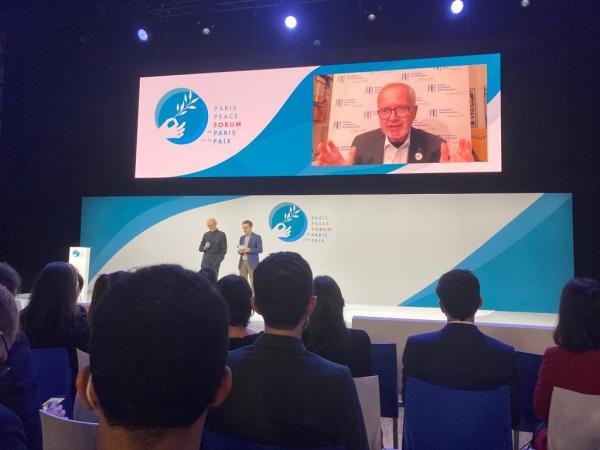
EIB President Werner Hoyer visited the French capital for the fourth edition of the Paris Peace Forum. This three-day event, which brought together hundreds of speakers from around the world representing governments, international organisations, the private sector, civil society, think tanks and the academic world, was an opportunity to address the various gaps in global governance, echoing the COP26 summit in Glasgow.
In the presence of several heads of state and international organisations, including French President Emmanuel Macron and US Vice President Kamala Harris, President Hoyer first expressed solidarity with the most vulnerable countries facing the COVID-19 pandemic, emphasising that this was a global crisis requiring global solutions. After a dinner at the Elysée Palace hosted by French President Macron, who stressed the importance of “a multilateralism that works” to meet current challenges, President Hoyer shared his thoughts on the progress and shortcomings of the COP26 summit at the closing ceremony of the forum, presented by SheSays founder Trisha Shetty and Paris Peace Forum Director General Justin Vaïsse. President Hoyer was joined by Ban Ki Moon, Global Green Growth Institute President and Chair and former UN Secretary-General, John Kerry, United States special presidential envoy for climate, and Huang Runqiu, China’s Minister of Ecology and Environment, in a vivid session moderated Peace Forum President Pascal Lamy.
President Hoyer highlighted the change of mindset in the financial world towards climate change. “COP26 has been a real turning point. Capital markets have now really understood the 1.5-degrees by 2100 challenge. This is a fundamental change. Sustainable finance has moved to centre stage.”
Arguing that savings at a global level are sufficient to finance the global transition, President Hoyer warned, however, that there was still much to be done in anticipation of the upcoming COP27 summit. “Markets are not yet sufficiently developed for natural capital, such as forests, oceans, water and soils, and what is still missing is a comprehensive policy framework to allow these values to be captured by markets,” he declared.
President Hoyer was also pleased to note a growing sense of pragmatism and a positive approach in Glasgow rather than a focus on doomsday scenarios. He called on the private sector to do more to achieve net zero emissions by 2050, stating, “To get there, we need new accessible and scalable green technologies. The question of how to leverage limited public funds to scale private investments remains. Multilateral development banks can play a significant role.”
In conclusion, President Hoyer said he was cautiously optimistic, stressing the need to find a systemic multilateral approach to tackle global warming. “We must bring climate, innovation and development very close together. That’s what we are doing in the EIB with the creation of a new development branch,” he said. “The solutions to these issues will only work with much closer cooperation with developing nations but also with much closer involvement of the private sector.”